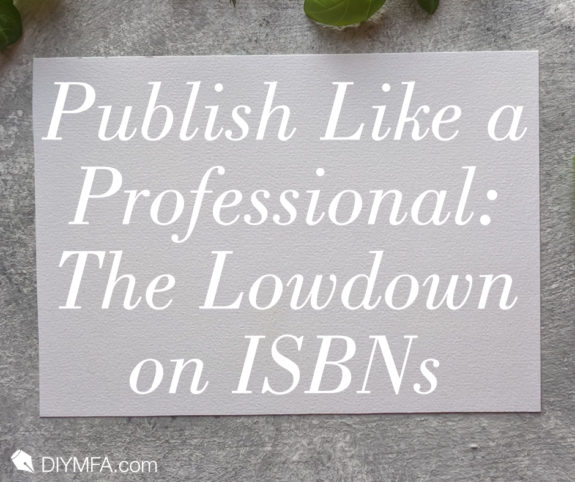On the back of every book you’ve bought in a bookstore, you’ll find a string of numbers, usually punctuated with dashes. It looks something like this: 978-0-9997003-0-3. This mysterious code is an International Standard Book Number, or ISBN. If you’re a self-publishing author, you should consider having them for your books.
What Is An ISBN?
The ISBN is an internationally recognized identifier that distinguishes a particular literary product, facilitating marketing by and to bookstores, libraries, and other gateways to the reading public. It consists of thirteen digits, broken down accordingly:
- The prefix (presently, 978 or 979).
- The group or country identifier
- The publisher identifier
- The title or edition identifier
- The check digit.
The prefix, currently 978 or 979, signifies that the number that follows is an ISBN. The group or country number indicates the country of origin of the published work. In the example here, 0 indicates the work was published in English (a 1 in its place would also indicate an English-language work). The number 2 is reserved for French-language works, 3 for German, and so on.
The third set of numbers identifies the publisher. In this example, the publisher Bricolage Books (my imprint) is denoted by the seven-digit sequence 9997003. The -0- that follows represents the specific title, edition, and format designated by the publisher (in this case, the first book in this series published by Bricolage Books). The final number, 3, is an algorithmically-generated number and if you want to know the particulars about its generation, you can read about them here.
Why Do I Need An ISBN?
Your own ISBNs efficiently stake your book’s claim in the literary universe. ISBNs are about inventory management, and as an author-publisher, you’re the one doing the management. Whether your work is virtual or exists in real life, these numbers will help you and your distribution partners track, promote, and sell it.
For print
While it’s not necessary to have an ISBN to publish an e-book, they are required for print books. Many readers still prefer print books over digital, so if you don’t have a print option you’re shutting yourself out of a potential market. Also, if you wish to distribute your print books through bookstores or libraries, an ISBN will facilitate ordering and distribution. Libraries offer a channel for discoverability both through print and e-book lending, and OverDrive, a key distributor of digital books to libraries, requires an ISBN for any product it handles.
For audio
Audiobook consumption is on the rise, especially among readers under age 45. If you want a piece of this action, you’ll need an ISBN (and note: it has to be a different ISBN from your print book or from your e-book).
Portability
If you’re publishing through Amazon, you can opt to get a free ISBN from them (this is different from the ASIN, which is the Amazon Standard Identification Number and distinguishes every product Amazon sells, from your book to a gas grill to a bag of dog treats.). Some other distributors, such as Smashwords, also offer free ISBNs to authors publishing on their sites. However, you can’t use these free ISBNs to distribute your book to other channels. Amazon owns the ISBN it gives you and if you use it, you can only sell that ISBN-identified book through Amazon. Many bookstores will not carry books with an Amazon-owned ISBN. Why should they? Every time they sold one of those books, they’d be paying their competition.
IngramSpark, on the other hand, distributes e-books and print books to bookstores, libraries, and other channels around the world, and they offer good terms that can entice those channels to take a chance on a new or unknown author. If you own your own ISBN, you can use the same number on your book regardless of the source that distributes them. I own the ISBNs for my books and use one number for print distribution via Ingram, IndieBound, Barnes & Noble, and Amazon. Likewise, I use one number for the epub version of my books, which are distributed through numerous channels.
Professionalism
Owning your own ISBNs makes you look more professional as an author-publisher. Using the free ISBNs from various distributors means the same book may have half a dozen or more identifiers–that’s more information for you to track and may cause some confusion over your work in the marketplace. Not only is using your own ISBNs more efficient, it shows you care about making your work discoverable and trackable through the established distribution channels. When you’re an indie author, you need all the visibility you can get. Don’t expect bookstores and libraries to cater to you. You need to make things easy on them. Respect and play by their systems.
As a side note, as a publisher, your ISBNs become assets in a business context. If you sell your publishing company, your unused ISBNs represent property that can be sold to your buyer just as if they were physical inventory in a warehouse, or an office building you owned.
Downsides of Owning Your Own ISBNs
For most authors, owning their own ISBNs will cost money up-front. You’ll need a different ISBN for each digital format you publish in (Amazon requires the .mobi format, while Kobo, Apple, and Barnes & Noble, among others, require .epub). You’ll also need individual ISBNs for each print format (hardback, paperback, large-print, etc.) you use, or for audio. All of this can add up. If you’re already working on a tight budget, this might be one place you can cut a corner. However, you can save money by buying ISBNs in packages of 10 or 100, cutting the unit cost.
If you don’t care about print distribution and want to focus only on e-books, ISBNs aren’t a prerequisite to publishing your work, and their absence may not impact your discoverability in digital stores, where customers tend to browse by genre, content, or author name.
Where Can I Get My Own ISBNs?
It varies from country to country. In the US, ISBNs are distributed by R. R. Bowker and in Australia, Thorpe-Bowker. In the UK, Nielsen sells them. Both companies, naturally, charge a fee for these numbers. If you live in Canada, you’re lucky: Library and Archives Canada distributes ISBNs for free. Other countries have their own distributing agencies, which can be identified here.
ISBNs aren’t sexy, but let’s face it: the same is true of most aspects of business. They can, however, make your life as an author-publisher easier by streamlining your product management, and that’s definitely attractive. If you’re serious about building a career in self-publishing for the long haul, consider investing in your own ISBNs.

Helen J. Darling writes contemporary women’s fiction. Her first novel, I’ll Know Me When I Find Me, was self-published in January 2018. You can connect with her at itshelendarling.com and on Instagram at @itshelendarling.







